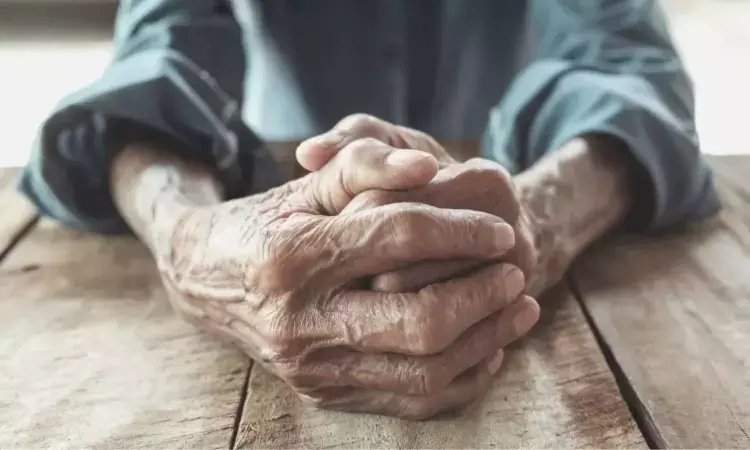- Home
- Medical news & Guidelines
- Anesthesiology
- Cardiology and CTVS
- Critical Care
- Dentistry
- Dermatology
- Diabetes and Endocrinology
- ENT
- Gastroenterology
- Medicine
- Nephrology
- Neurology
- Obstretics-Gynaecology
- Oncology
- Ophthalmology
- Orthopaedics
- Pediatrics-Neonatology
- Psychiatry
- Pulmonology
- Radiology
- Surgery
- Urology
- Laboratory Medicine
- Diet
- Nursing
- Paramedical
- Physiotherapy
- Health news
- Fact Check
- Bone Health Fact Check
- Brain Health Fact Check
- Cancer Related Fact Check
- Child Care Fact Check
- Dental and oral health fact check
- Diabetes and metabolic health fact check
- Diet and Nutrition Fact Check
- Eye and ENT Care Fact Check
- Fitness fact check
- Gut health fact check
- Heart health fact check
- Kidney health fact check
- Medical education fact check
- Men's health fact check
- Respiratory fact check
- Skin and hair care fact check
- Vaccine and Immunization fact check
- Women's health fact check
- AYUSH
- State News
- Andaman and Nicobar Islands
- Andhra Pradesh
- Arunachal Pradesh
- Assam
- Bihar
- Chandigarh
- Chattisgarh
- Dadra and Nagar Haveli
- Daman and Diu
- Delhi
- Goa
- Gujarat
- Haryana
- Himachal Pradesh
- Jammu & Kashmir
- Jharkhand
- Karnataka
- Kerala
- Ladakh
- Lakshadweep
- Madhya Pradesh
- Maharashtra
- Manipur
- Meghalaya
- Mizoram
- Nagaland
- Odisha
- Puducherry
- Punjab
- Rajasthan
- Sikkim
- Tamil Nadu
- Telangana
- Tripura
- Uttar Pradesh
- Uttrakhand
- West Bengal
- Medical Education
- Industry
Loneliness at the End of Life tied to Adverse Health Outcomes among Adults

Ranchi Old-Age Home Residents Benefit from New Mother Teresa Clinic Initiative
New research reveals that loneliness is common in adults at the end of life due to a lack of social support and an inability to share emotions. It is associated with adverse health outcomes leading to high end-of-life healthcare utilization. The study was published in the Journal of Clinical Nursing.
Loneliness is a highly subjective experience of the deficit between actual and desired levels of social contact. Loneliness can be social loneliness, emotional loneliness, and existential loneliness. Deteriorating health status, narrowed social networks, loss of social roles, and fear of death are common situations for people at end-of-life (EOL). Loneliness is the major risk factor for physical and mental health problems. Loneliness is a disease state from a biomedical instead of a psychosocial perspective. As loneliness is an unpleasant and inevitable experience and there is limited research on the ways to lessen it, researchers conducted a scoping review to describe the prevalence, identify assessment tools, describe the associated conditions, and identify interventions to alleviate loneliness at EOL.
Following the methodology proposed by Arksey and O'Malley, Nine electronic databases were searched from January 2001 to July 2022. Studies about loneliness at end-of-life were included. Two review authors independently screened and selected relevant studies and performed the data charting. The PAGER framework was employed to collate, summarise and report the results. The PRISMA-ScR checklist was included.
Key findings:
- Among the 23 studies included in this review, there were 12 qualitative, 10 quantitative, and one mixed-methods design.
- There was no reliable data about the prevalence of loneliness among adults at end-of-life internationally.
- A three or 20-item UCLA loneliness scale was frequently used to measure loneliness.
- Passive and active withdrawal from social networks, inability to share emotions and to be understood, and inadequate support on spirituality were the main factors that predisposed adults at end-of-life to loneliness
- Four strategies were suggested to alleviate loneliness but none were substantiated in clinical trials.
- Interventions like spirituality, social interactions, and connectedness were effective in alleviating loneliness.
Thus, this is the first scoping review conducted on loneliness in adults at the end of life that shows that adults at the end of life need social support and networks to lessen loneliness. Healthcare staff and nurses who take care of adults should proactively assess loneliness or perceived social isolation. Collaborative efforts that encourage self-worthiness, social engagement, and connectedness with significant others and social networks are needed to limit loneliness.
Further reading: Loneliness at end-of-life: A scoping review.https://doi.org/10.1111/jocn.16748
BDS, MDS
Dr.Niharika Harsha B (BDS,MDS) completed her BDS from Govt Dental College, Hyderabad and MDS from Dr.NTR University of health sciences(Now Kaloji Rao University). She has 4 years of private dental practice and worked for 2 years as Consultant Oral Radiologist at a Dental Imaging Centre in Hyderabad. She worked as Research Assistant and scientific writer in the development of Oral Anti cancer screening device with her seniors. She has a deep intriguing wish in writing highly engaging, captivating and informative medical content for a wider audience. She can be contacted at editorial@medicaldialogues.in.
Dr Kamal Kant Kohli-MBBS, DTCD- a chest specialist with more than 30 years of practice and a flair for writing clinical articles, Dr Kamal Kant Kohli joined Medical Dialogues as a Chief Editor of Medical News. Besides writing articles, as an editor, he proofreads and verifies all the medical content published on Medical Dialogues including those coming from journals, studies,medical conferences,guidelines etc. Email: drkohli@medicaldialogues.in. Contact no. 011-43720751



